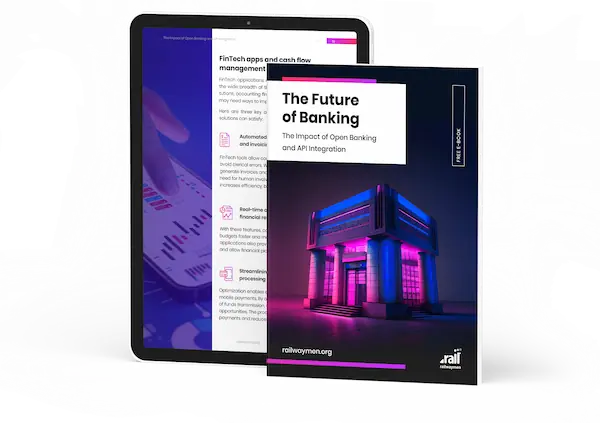FinTech, also known as financial technology, has revolutionized banking and modern finance. The definition of FinTech includes all innovative technologies that are used to improve and automate financial transactions. These include simple applications for mobile payments, as well as more complex technologies such as cryptocurrencies or blockchain.
In this article, the current financial technology market overview and the so-called ABCD of FinTech will be discussed.
Table of Contents:
Table of Contents:
1. Financial Technology Industry Overview
7. Applications of ABCD in FinTech
8. FinTech for Financial Inclusion
9. Regulatory Environment for FinTech Companies
10. Future of Financial Technology
12. Start working on a dedicated FinTech application for your business
13. Explore FinTech solutions developed by Railwaymen
Financial Technology Industry Overview
After a deep dive into the financial technology industry, based on the Global FinTech Market Report it can be said that the FinTech sector is currently booming.
As we move into 2023, the total number of FinTech companies is over 30,000 and still growing. According to the above-mentioned report, the FinTech industry is estimated to reach a size of around $305 billion with an average annual growth rate of about 20% by 2025.
Digital payments play a crucial role in enhancing and automating financial services. Indian fintech companies integrate digital payments alongside other technologies to replace traditional financial services, showcasing the growing importance of this sector within the broader fintech market.
One of the driving factors for the development of financial technology is that many traditional banks are supporters of these innovations, and they try to implement them by actively investing, acquiring or collaborating with many fintech companies.
This allows established banking institutions to offer digitally savvy customers what they want, while moving the industry forward and staying up-to-date.

ABCD in FinTech
The term ABDC in FinTech actually corresponds to four integral technologies that have contributed to the creation and implementation of most technologies in the financial technology industry. The acronym ABCD stands for: A - Artificial Intelligence, B - Blockchain, C- Cloud Computing and D - Data, and it’s associated with most offered FinTech services.
AI has automated fundamental services within the financial sector, enhancing the efficiency of traditional processes like credit analysis and wealth management.
Indian fintech companies are leveraging technology to innovate and replace traditional financial services, catering to various sectors such as lending, insurance, and digital payments.

#Artificial Intelligence
Artificial intelligence is known as a field of computer science that aims to facilitate the design and development of computers that can perform activities that are the domain of humans and, in particular, that require intelligence. Its concept was first used by John McCarthy in 1956 during a conference in Dartmouth devoted to technology.
Nowadays, AI is understood as the ability of machines to exhibit human skills such as reasoning, learning, planning, and creativity, while allowing technical systems to perceive their environment and solve problems, working towards a specific goal. There are various aspects of AI, including natural language processing (NLP), which refers to language, often written, and machine learning.

2017 was a breakthrough year when it comes to the development of Artificial Intelligence. The interest in AI has skyrocketed, many of its applications have taken place in the FinTech industry - these events led Fortune and Forbes to declare 2017 the year of Artificial Intelligence.
AI undoubtedly has an impact on changing the alternative finance user interfaces - from facial and voice recognition to biometric identity management to chatbots, whose main task is to offer personalized recommendations regarding customer needs. It is also allowing some financial firms to create new business models focused on analyzing customer data rather than building platforms to provide financial fund flow.
#Blockchain
Blockchain is otherwise a distributed database or general ledger that is shared by computer network nodes.
Blockchain as a database stores all electronic data in digital form. It plays a key role in cryptocurrency systems (such as Bitcoin or Ethereum) in maintaining a secure and decentralized transaction ledger. This innovative technology will ensure fidelity and security of data recording.
An important purpose of blockchain is to enable the recording and dissemination of digital information, excluding its editing. Thanks to this, blockchain is recognized as the basis for immutable ledgers or transaction records, i.e. distributed ledger technologies (DLT). Distributed ledger technology is foundational to blockchain, especially in cryptocurrencies and financial services. Its secure, decentralized nature enables efficient transactions and reduces fraud through a consensus mechanism, though it requires significant investment and expertise for implementation.
Cryptocurrencies are now recognized as one of the most recognizable developments in the financial technology sector. It is a new digital asset that has emerged as a viable alternative funding source for both individuals and businesses. Cryptocurrencies are now a new online capital market that is revolutionizing transaction processes across multiple industries.

#Cloud Computing
The name cloud computing comes from the fact that the information being accessed is located remotely in a cloud or virtual space. Thanks to the cloud, it is possible to access all data, files and applications that are stored in the cloud on remote servers - it means that the user does not need to be in a specific place to access it.
Cloud computing has also contributed to the development of new business models - for example, software as a service (SaaS).
It replaces the traditional model of developing and selling software by vendors, but requires a software license. Software that is in the cloud can be sold at a lower initial cost, for example, based on a subscription model.
This means that initial operating costs are lower, so it is especially important to prototype new business models and user interfaces to implement them faster and more efficiently.

#Data
Banks and financial institutions for a long time generated large amounts of information about customers and mainly based on it.
Most of the data was collected through paper forms or surveys filled out by customers and employees. Such documentation was problematic to search or manipulate for analysis.
The digitization of paper data and documents allows for easier storage, transmission, searching, processing, analyzing, and displaying of information, facilitating online banking and allowing to better manage customer information. Data Storage cost continues to fall, while data is being collected at a relatively fast pace through online activity and connected devices. It also allows for gathering structured as well as the unstructured data.
Advancements in data analytics are tailored to enhance service personalization, client retention, and overall business outcomes in the wealth management sector. This integration with behavioral analytics and fintech solutions is transforming how wealth management services are delivered.
In the FinTech industry, a special impact has Big Data because it helps in organizing massive amounts of data and transforming it into actionable insights. These Big Data insights can then be used by FinTech companies to drive market forecasts, design future strategies, and even personalize and meet customer expectations, among other advantages.

Applications of ABCD in FinTech
The ABCD technologies in FinTech are revolutionizing the financial sector with numerous practical applications.
-
Artificial Intelligence (AI): AI is transforming how financial institutions operate by automating financial transactions, such as fraud detection and risk assessment. AI-powered chatbots are increasingly used to provide customer support and personalized financial advice, enhancing customer experience and operational efficiency.
-
Blockchain: Blockchain technology is creating secure and transparent distributed ledger systems for financial transactions. This innovation reduces the risk of fraud and increases the efficiency of financial transactions, making it a cornerstone of modern financial technology.
-
Cloud Computing: Cloud computing offers scalable and secure infrastructure for financial institutions. It enables the storage and processing of large amounts of customer data efficiently, supporting the rapid growth and innovation in the financial sector.
-
Data Analytics: Data analytics provides deep insights into customer behavior and preferences. Financial institutions leverage this technology to personalize their services and launch targeted marketing campaigns, ultimately improving customer satisfaction and loyalty.
FinTech for Financial Inclusion
FinTech is playing a crucial role in promoting financial inclusion by providing access to financial services for underserved populations.
-
Mobile Payments and Digital Wallets: These technologies are revolutionizing access to financial services in developing countries, where traditional banking services are often unavailable. They enable people to perform financial transactions quickly and securely, fostering economic growth and stability.
-
Peer-to-Peer Lending Platforms: These platforms offer credit access to individuals and small businesses that might not qualify for traditional loans. By connecting borrowers directly with lenders, they democratize access to credit and support entrepreneurial ventures.
-
Blockchain Technology: Blockchain is enhancing financial inclusion by creating secure and transparent systems for financial transactions. This reduces the risk of fraud and increases trust in financial systems, making financial services more accessible to everyone.
Regulatory Environment for FinTech Companies
The regulatory environment for FinTech companies is rapidly evolving to keep pace with technological advancements.
-
Support for Innovation: Regulatory bodies are increasingly recognizing the benefits of FinTech and are developing frameworks that support innovation and growth. This proactive approach helps FinTech companies thrive while ensuring consumer protection.
-
AML and KYC Regulations: Anti-money laundering (AML) and know-your-customer (KYC) regulations are being updated to address the changing nature of financial transactions and the integration of new technologies like blockchain. These updates help prevent financial crimes and ensure the integrity of financial systems.
-
Data Protection Regulations: Regulations such as the General Data Protection Regulation (GDPR) in the European Union are being implemented to protect customer data. These regulations ensure that financial institutions handle customer data securely and responsibly, fostering trust and compliance.
Future of Financial Technology
The future of financial technology is both exciting and rapidly evolving, with several key trends set to shape the industry.
-
Artificial Intelligence and Machine Learning: The use of AI and machine learning is expected to increase, leading to more personalized and efficient financial services. These technologies will enable financial institutions to better understand and serve their customers.
-
Blockchain Technology: The adoption of blockchain is likely to continue, providing more secure and transparent financial transactions. This will enhance trust and efficiency in the financial sector.
-
Cloud Computing and Data Analytics: The use of cloud computing and data analytics is set to grow, leading to more efficient and effective financial institutions. These technologies will support the processing and analysis of vast amounts of customer data, driving innovation and growth.
-
Evolving Regulatory Environment: The regulatory landscape will continue to evolve, focusing on supporting innovation while protecting customer data and preventing financial crime. This balance will be crucial for the sustainable growth of the FinTech industry.
By understanding and leveraging these trends, financial institutions can stay ahead of the curve and continue to innovate in the rapidly changing world of financial technology.
Conclusion
Blockchain, Big Data, Cloud Computing, and Artificial Intelligence, undoubtedly, have an impact on the development and growth of alternative finance and are the driving force behind FinTech.
Nowadays, innovation is one of the key features that enterprises should have because thanks to it, the public or private companies can survive on the market and have the opportunity to develop.
Start working on a dedicated FinTech application for your business
At Railwaymen, we’re passionate about bringing innovative FinTech solutions to life. If you're looking to develop cutting-edge financial technology for your business or want to explore how we can help optimize your operations, don’t hesitate to reach out to our team. Let’s discuss how we can turn your FinTech ideas into reality!
Let's talk with us about your project
Explore FinTech solutions developed by Railwaymen.
If you are curious and want to learn about financial technology solutions used in practice, check out our Case Studies section on our website!
There you will find many stories of the development of our applications and the course of each project from the first meeting with the client.
This is a massive dose of information that will help you open up to the world of finance and understand its dependencies. Maybe you'll even get inspired to create some apps, who knows? :)
Source of images: https://pixabay.com/
Discover our newest e-book
Are you concerned about the future of banking and how it will affect the entire industry? Look no further than our e-book "The Impact of Open Banking and API Integration on the Future of Banking". This comprehensive guide will provide you with all of the information you need to stay ahead of the curve in this rapidly changing landscape. Find out what kind of future is being written for the FinTech industry and how to best prepare your company for it.
DOWNLOAD NOW






